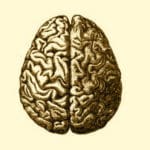How do I Love God with My Whole Mind?
Part I of II
Dear Father John, in both the Old and the New Testament it talks about loving God with our whole mind. I’m sure I don’t even know my whole mind completely. So, how do I love God with my whole mind?
CHRISTIANIZING THE MIND, learning to love God with our whole mind, involves more than simply filling  our heads with information. The mind is more than a hard drive. The human mind, our intellect, is a directive power built into our nature. Our capacity to know shows us the way things are and the way we should behave. To value and form these capacities in harmony with our Christian vocation requires taking some time to reflect on their various dimensions. As we show and grow our love for Christ in this arena of our lives, we need to be aware of at least three things, three interrelated functions of the human mind: information gathering, thinking deeply, and training our memory.
our heads with information. The mind is more than a hard drive. The human mind, our intellect, is a directive power built into our nature. Our capacity to know shows us the way things are and the way we should behave. To value and form these capacities in harmony with our Christian vocation requires taking some time to reflect on their various dimensions. As we show and grow our love for Christ in this arena of our lives, we need to be aware of at least three things, three interrelated functions of the human mind: information gathering, thinking deeply, and training our memory.
Gathering Information
 Though information gathering–learning, coming to know more both in breadth and depth–is not the only function of the mind, it is a primary function. The healthy desire for more knowledge about our faith, and about how to live out that faith, flows from this function. A steady increase of knowledge is necessary for spiritual growth. Jesus is the Word of God, and a word communicates content, meaning. The more we know about God, about God’s purpose for the world, about God’s plan of salvation, and about how God sees us and wants to interact with and guide us, the better.
Though information gathering–learning, coming to know more both in breadth and depth–is not the only function of the mind, it is a primary function. The healthy desire for more knowledge about our faith, and about how to live out that faith, flows from this function. A steady increase of knowledge is necessary for spiritual growth. Jesus is the Word of God, and a word communicates content, meaning. The more we know about God, about God’s purpose for the world, about God’s plan of salvation, and about how God sees us and wants to interact with and guide us, the better.
Receiving God’s revelation and grasping it with our minds overcomes the natural ignorance of our human condition. It also gradually purifies us of the malicious misinformation that we imbibe by living in a fallen world with a fallen nature. We are full of distorted ideas about ourselves, our world, and God. God’s revelation is given to us to expose these lies and enlighten our darkened intellects.
Thirsting for deeper knowledge of our beloved Lord is a common theme in the Scriptures. The Psalmist puts it succinctly: “Blessed are you, O Lord; teach me your statutes” (Psalm 119:12). The Book of Proverbs repeats it untiringly:
Hear, O children, a father’s instruction, be attentive, that you may gain understanding! Yes, excellent advice I give you; my teaching do not forsake…. The beginning of wisdom is: get wisdom; whatever else you get, get understanding (Proverbs 4:1—2, 7).
A healthy Christian is, among other things, a learning Christian.
Going Deeper
 The second function of the intellect has to do not so much with gathering more and more information, but rather with deepening our understanding of the truths we already know and thinking deeply about them. A school-boy can memorize the Gettysburg Address, but the words he memorizes will mean much less to him than they did to Abraham Lincoln when he wrote that address. Truth has breadth, but it also has depth.
The second function of the intellect has to do not so much with gathering more and more information, but rather with deepening our understanding of the truths we already know and thinking deeply about them. A school-boy can memorize the Gettysburg Address, but the words he memorizes will mean much less to him than they did to Abraham Lincoln when he wrote that address. Truth has breadth, but it also has depth.
The Latin root for the word intelligence includes two words: intus and legere. Together they connote “reading into” something–penetrating the deeper meaning of things. Our minds are meant to do this, too. When we forget about this, we may grow in breadth of knowledge, but we will not necessarily grow in wisdom, in understanding. We will be like a computer with lots of data, but not necessarily a deeper spiritual person, in tune with the true meaning of God’s wonderful universe.
One of the Blessed Virgin Mary’s traditional titles is “Seat of Wisdom.” In the New Testament she models this dimension of the human mind, this quest not just for breadth but for depth. Multiple times, the Gospels show her mulling over, intentionally and prayerfully, God’s revelation in Christ: “And Mary kept all these things, reflecting on them in her heart” (Luke 2:19).
Editor’s Notes:
- In Part II, we will examine the third function: remembering, and the power of memory, which is connected to remembering.
- This is another excerpt from Father John Bartunek’s new book “Seeking First the Kingdom” filled with “practical examples and down-to-earth wisdom which will show you how to bring Christ into each facet of your life”. Click here to learn more about the book…or if you wish to get it for a friend or relative who doesn’t read on line.
Art: Sepia of Cerebro Humano (Human Brain), Carente de Fontes, AndreFTG, 6 May 2008, PD-Worldwide; Il manoscritto perduto (The Lost Manuscript), Jean Henri De Coene, 19th century, PD-US author’s life plus 100 years or less; In Meditations (60th Years), Ion Chibzii, 19 April 2011, CCA-SA; Wikimedia Commons.


